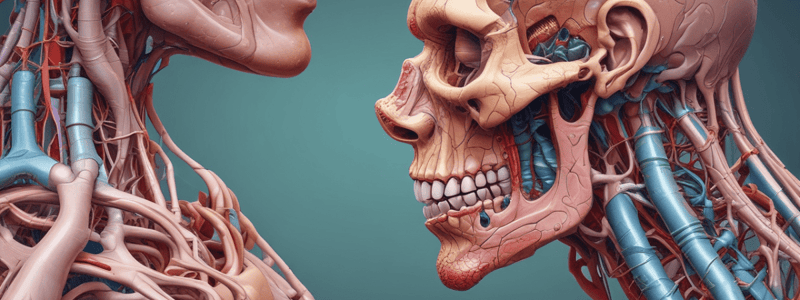Podcast
Questions and Answers
What is the main characteristic of salivary glands?
What is the main characteristic of salivary glands?
- Exocrine glands (correct)
- Hormone-producing glands
- Endocrine glands
- Neurotransmitter-producing glands
What is the sequence of cells in the salivary gland ductal tree?
What is the sequence of cells in the salivary gland ductal tree?
- Myoepithelial cells → Acinar cells → Duct cells (correct)
- Acinar cells → Duct cells → Myoepithelial cells
- Duct cells → Acinar cells → Myoepithelial cells
- Acinar cells → Myoepithelial cells → Duct cells
Where are minor salivary glands located?
Where are minor salivary glands located?
- In the sublingual gland only
- Only in the parotid gland
- In most oral mucosal surfaces (correct)
- Only in the submandibular gland
What is the mechanism of salivary secretion?
What is the mechanism of salivary secretion?
What is a characteristic of reflex salivary secretion?
What is a characteristic of reflex salivary secretion?
What is the primary function of parasympathetic nerves in salivary glands?
What is the primary function of parasympathetic nerves in salivary glands?
Which of the following is NOT a characteristic of sympathetic nerves in salivary glands?
Which of the following is NOT a characteristic of sympathetic nerves in salivary glands?
What is the primary function of striated ductal cells in salivary glands?
What is the primary function of striated ductal cells in salivary glands?
Which of the following proteins is NOT produced by acinar cells?
Which of the following proteins is NOT produced by acinar cells?
What is the mechanism by which salivary gland fluid secretion is dependent on?
What is the mechanism by which salivary gland fluid secretion is dependent on?
What is the effect of atropine on salivary gland fluid secretion?
What is the effect of atropine on salivary gland fluid secretion?
Flashcards are hidden until you start studying
Study Notes
Oral Stimuli and Salivary Glands
- Oral stimuli include gustatory, masticatory, olfactory, thermoreceptive, and nociceptive stimuli.
- Afferent pathway involves transmission of stimuli to the nucleus of the solitary tract (NST), thoracic spinal cord, and finally to salivary nuclei, medulla, and brainstem.
Mechanisms of Salivary Secretion
- Parasympathetic nerves evoke most fluid secretion, some protein secretion, cause vasodilation, and contract myoepithelial cells.
- Sympathetic nerves act collaboratively with parasympathetic nerves, seldom cause fluid secretion, cause protein secretion, and contract myoepithelial cells.
- Denervation of parasympathetic nerves causes gland atrophy, while denervation of sympathetic nerves causes some gland atrophy.
Formation and Secretion of Saliva
- Saliva is formed by acinar cells in the salivary gland epithelial cells.
- Acinar cells synthesize and secrete different mixtures of proteins in different glands:
- Parotid gland: serous
- Submandibular gland: seromucous
- Sublingual gland: mucous
- Salivary protein secretion includes blood proteins (albumin, IgA) and acinar proteins (amylase, mucins, PRPs, statherins).
Ductal Cell Modification of Saliva
- Striated ductal cells modify saliva by reabsorbing sodium and secreting potassium.
- Resting/unstimulated saliva is isotonic, while stimulated saliva is hypotonic.
- Ductal cell modification of saliva involves changes in sodium, potassium, and chloride concentrations.
Salivary Glands
- Salivary glands are exocrine glands that secrete onto the surfaces of the mouth.
- There are major salivary glands (parotid, submandibular, sublingual) and minor salivary glands (present in most oral mucosal surfaces).
- Minor salivary glands are present in the oral mucosa, including labial and palatine minor glands.
Newly Discovered Paired Salivary Glands
- Newly discovered paired salivary glands are present in the oral cavity.
- Salivary secretion is a nerve-mediated reflex involving collaboration between parasympathetic and sympathetic nerves.
Studying That Suits You
Use AI to generate personalized quizzes and flashcards to suit your learning preferences.




